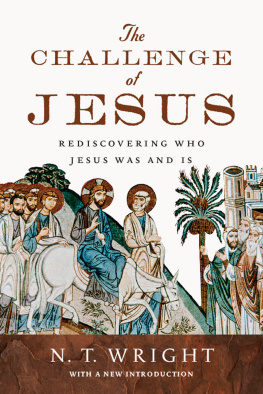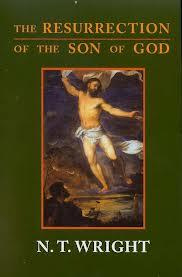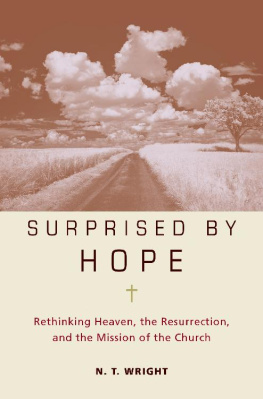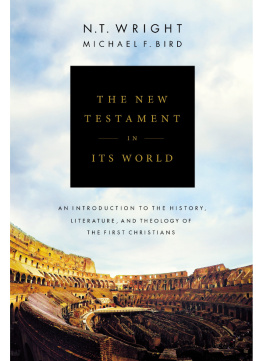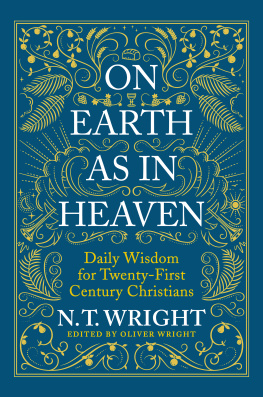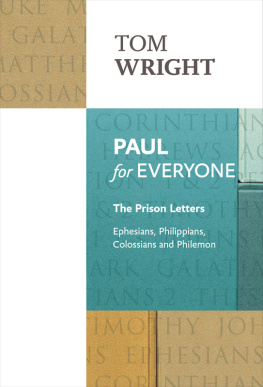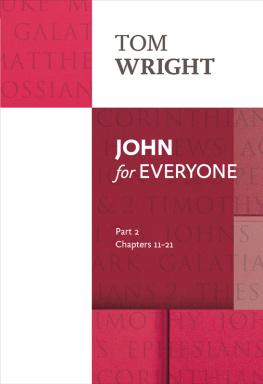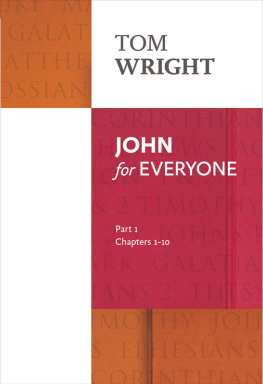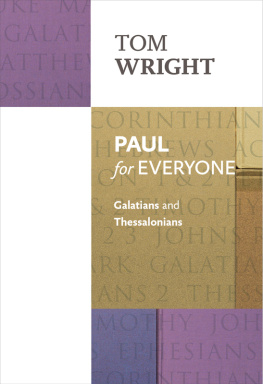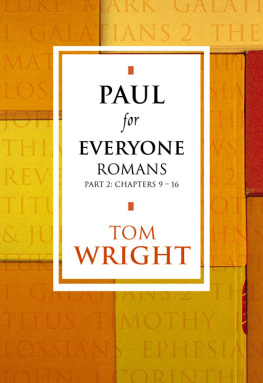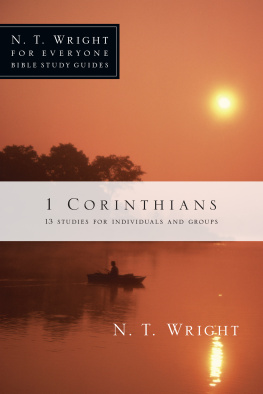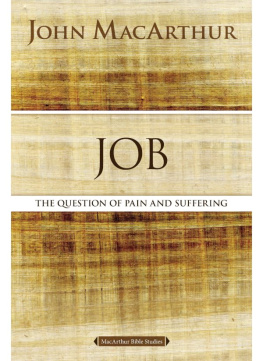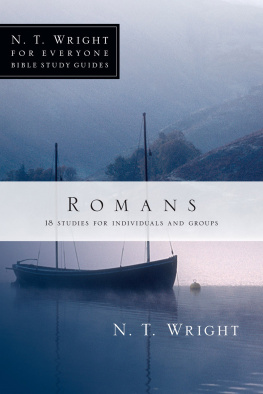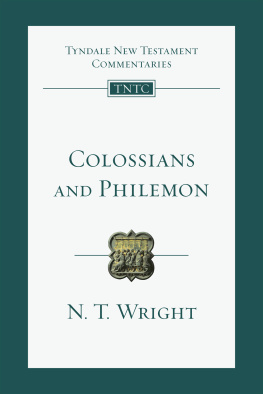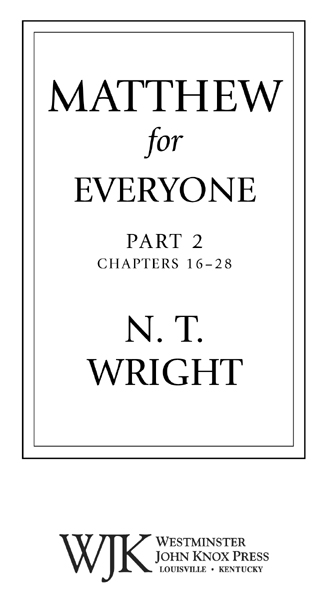
Copyright 2002, 2004 Nicholas Thomas Wright
First published in Great Britain in 2002 by the
Society for Promoting Christian Knowledge
36 Causton Street
London SW1P 4ST
This second edition copublished in 2004 by the Society for Promoting
Christian Knowledge, London, and Westminster John Knox Press,
100 Witherspoon Street, Louisville, KY 40202.
All rights reserved. No part of this book may be reproduced or transmitted in any form or by any means, electronic or mechanical, including photocopying, recording, or by any information storage and retrieval system, without permission in writing from the Society for Promoting Christian Knowledge, 36 Causton Street, London SW1P 4ST.
09 10 11 12 13 14 10 9 8 7 6 5
British Library Cataloguing-in-Publication Data
A catalogue record for this book is available from the British Library.
ISBN-10: 0-281-05487-8 (U. K. edition)
United States Library of Congress Cataloging-in-Publication Data
is on file at the Library of Congress, Washington, D. C.
ISBN: 978-0-664-22787-6 (U. S. edition)
Typeset by Pioneer Associates, Perthshire
Printed in Great Britain by
Ashford Colour Press
CONTENTS
For
Christopher Philip Unwin,
priest and teacher of the faith,
with gratitude for the love, support and prayers
of over fifty years
INTRODUCTION
On the very first occasion when someone stood up in public to tell people about Jesus, he made it very clear: this message is for everyone.
It was a great day sometimes called the birthday of the church. The great wind of Gods spirit had swept through Jesus followers and filled them with a new joy and a sense of Gods presence and power. Their leader, Peter, who only a few weeks before had been crying like a baby because hed lied and cursed and denied even knowing Jesus, found himself on his feet explaining to a huge crowd that something had happened which had changed the world for ever. What God had done for him, Peter, he was beginning to do for the whole world: new life, forgiveness, new hope and power were opening up like spring flowers after a long winter. A new age had begun in which the living God was going to do new things in the world beginning then and there with the individuals who were listening to him. This promise is for you, he said, and for your children, and for everyone who is far away (Acts 2.39). It wasnt just for the person standing next to you. It was for everyone.
Within a remarkably short time this came true to such an extent that the young movement spread throughout much of the known world. And one way in which the everyone promise worked out was through the writings of the early Christian leaders. These short works mostly letters and stories about Jesus were widely circulated and eagerly read. They were never intended for either a religious or intellectual elite. From the very beginning they were meant for everyone.
That is as true today as it was then. Of course, it matters that some people give time and care to the historical evidence, the meaning of the original words (the early Christians wrote in Greek), and the exact and particular force of what different writers were saying about God, Jesus, the world and themselves. This series is based quite closely on that sort of work. But the point of it all is that the message can get out to everyone, especially to people who wouldnt normally read a book with footnotes and Greek words in it. Thats the sort of person for whom these books are written. And thats why theres a glossary, in the back, of the key words that you cant really get along without, with a simple description of what they mean. Whenever you see a word in bold type in the text, you can go to the back and remind yourself whats going on.
There are of course many translations of the New Testament available today. The one I offer here is designed for the same kind of reader: one who mightnt necessarily understand the more formal, sometimes even ponderous, tones of some of the standard ones. I have of course tried to keep as close to the original as I can. But my main aim has been to be sure that the words can speak not just to some people, but to everyone.
Matthews gospel presents Jesus in a rich, many-sided way. He appears as the Messiah of Israel, the king who will rule and save the world. He comes before us as the teacher greater even than Moses. And, of course, he is presented as the son of man giving his life for us all. Matthew lays it all out step by step and invites us to learn the wisdom of the gospel message and the new way of life that results from it. So here it is: Matthew for everyone!
Tom Wright
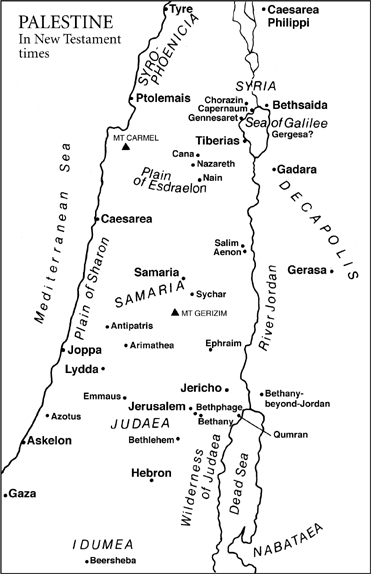
MATTHEW 16.112
The Leaven of the Pharisees
1The Pharisees and Sadducees came to Jesus and tried to catch him out by asking him to show them a sign from heaven.
2This was his reply to them: When its evening you say, Its going to be fine, because the sky is turning red. 3And in the morning you say, Its going to be stormy today, because the sky is red and gloomy. Well then: you know how to work out the look of the sky, so why cant you work out the signs of the times? 4The generation that wants a sign is wicked and corrupt! No sign will be given to it, except the sign of Jonah.
With that, he left them and went away.
5When the disciples crossed over the lake, they forgot to bring any bread. 6Watch out, said Jesus to them, and beware of the leaven of the Pharisees and Sadducees.
7They discussed it with each other. Its because we didnt bring any bread, they said.
8But Jesus knew what they were thinking.
You really are a little-faith lot! he said. Why are you discussing with each other that you havent got any bread? 9Dont you understand, even now? Dont you remember the five loaves and the five thousand, and how many basketfuls you picked up afterwards? 10Or the seven loaves and the four thousand, and how many baskets you picked up? 11Why cant you see that I wasnt talking about bread? Watch out for the leaven of the Pharisees and Sadducees!
12Then they understood that he wasnt telling them to beware of the leaven you get in bread, but of the teaching of the Pharisees and Sadducees.
Our generation is bombarded with signs. Drive along a city street, especially at night, and your eyes will be dazzled with signs of all sorts. Some of them are necessary to tell you where to go and where not to go: if you ignore red and green lights you will be in danger. Others are merely for decoration and information, pointing to particular buildings or illuminating them. Many others are designed to catch your imagination and your money. Advertisements twinkle and flash enticingly until their message has worked its way into your memory.
Part of growing up is learning to distinguish signs that matter, which must be obeyed, from signs that dont matter, that can (and perhaps should) be ignored. Something of the same puzzle faces us as we read the gospels. Sometimes Jesus does things which he himself speaks of as signs. Particularly in Johns gospel, but also in the others, some of his powerful deeds, especially his healings, are seen as signs of who he is, signs that the disciples



